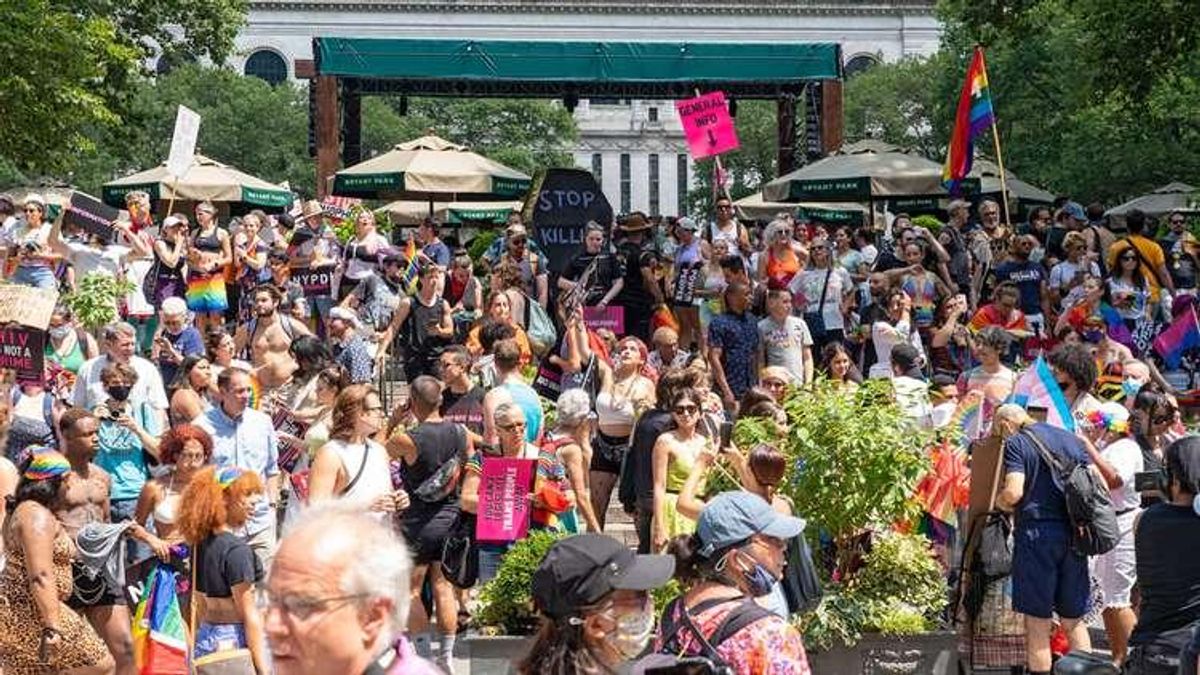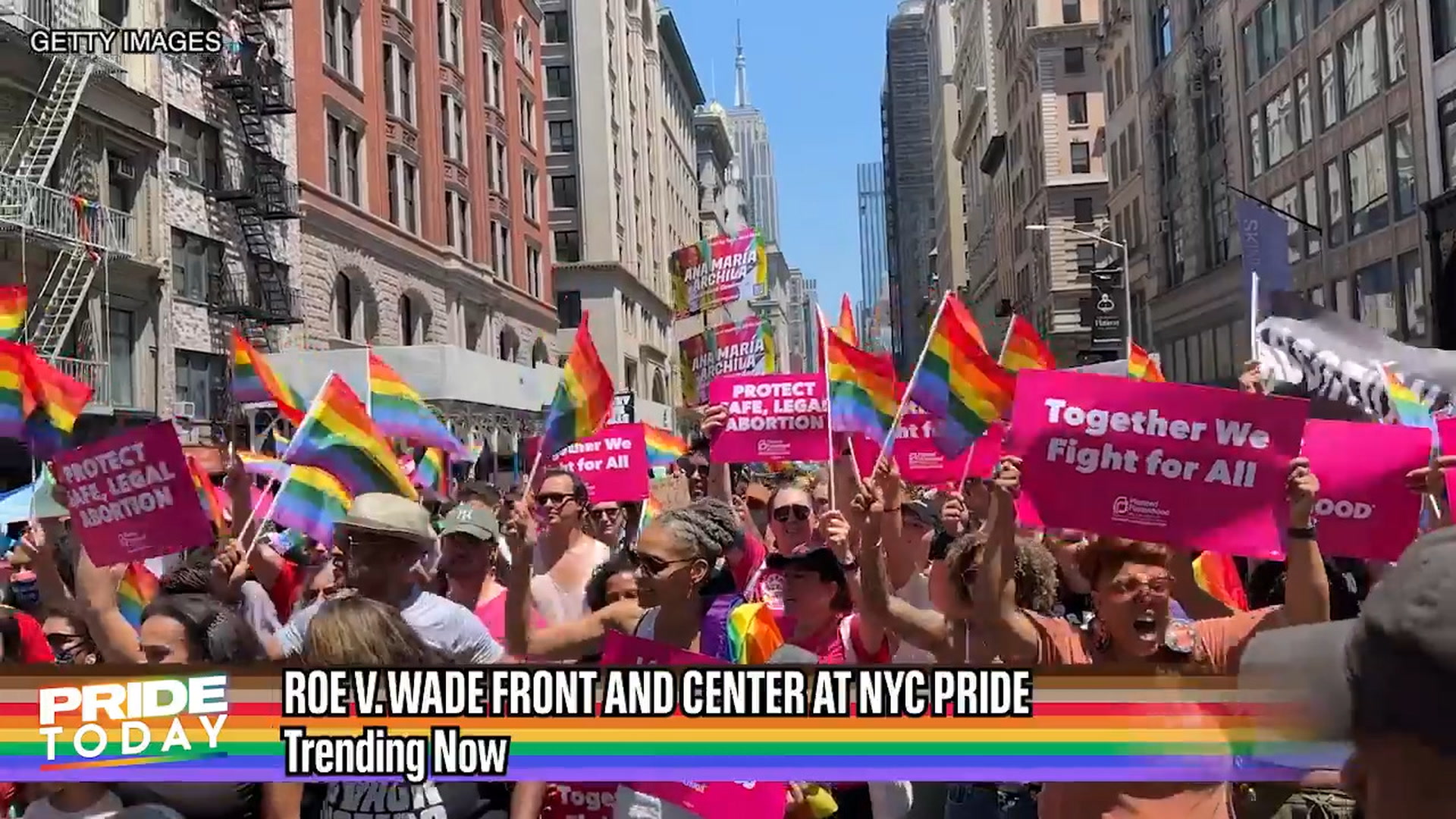Views expressed in The Advocate's opinion articles are those of the writers and do not necessarily represent the views of The Advocate or our parent company, Equal Pride.
Sunday's Pride events in New York City ended abruptly in chaos after fireworks were mistaken for gunshots, causing mass panic throughout the West Village. It suffices to say that Americans are anxious these days. And with good reason.
This is especially the case for BIPOC and LGBTQ+ folks as the rate of hate crimes continues to rise in the U.S. and around the world. In 2021, violence against trans, nonbinary, and gender-nonconforming folks had reached an all-time high, with 57 violent deaths reported that year. In 2022 there have been at least 17 violent deaths in that population. This comes in a year when at least 340 anti-LGBTQ+ bills have been proposed by Republican state legislators.
On Saturday, two people were killed and 21 were wounded in an attack at a gay bar in Oslo, Norway. While my boyfriend, Carlos, and I were on our way to Hell's Kitchen to meet a friend for drinks, I received a text from my dad: "Be careful." I knew then that he had seen the news. On Sunday, Carlos and I attended the Queer Liberation March. Carlos checked his phone and saw a message from his friend in Houston saying, "Not to be dramatic but always know where your exits are and where you can take cover." He read the message aloud as we both shared a nervous laugh. I would be lying if I said I didn't think a shooting was imminent at Pride. I'm sure most of us there were frightened, yet we did not want to admit it.
We went to Washington Square Park on Friday after the Supreme Court ruling striking down Roe v. Wade. Protesters entered from every which way toward the fountain, like blood traveling through the vessels of the body to the heart. By Sunday there was a collective understanding in Manhattan that anything could happen.
As with most of us with post-traumatic stress disorder, my brain can't help but think of an exit strategy. As we made our way up Sixth Avenue at the Queer Liberation March, I thought about what I would do if the crowd around us suddenly started running. My mind could not help but think back to the attack at Pulse six years ago. I remembered how that year some of my friends' parents barred them from attending Pride for fear of being attacked.
"Don't go into any large crowds!" I thought of my grandmother's words last week when I told her over the phone that I was attending the protest in the city. "They'll shoot you just for being gay." I thought of her warning as I peered up at the buildings around us.
I thought back to the last time I was caught in the panic of a crowd. I was laying on the grass of the Great Lawn at the Global Citizen Festival in 2018 when my friend first pointed out a motion in the crowd near the stage. "They are running!" Someone screamed.
It was night, and so the light from the stage and the skyscrapers in the distance illuminated the horror on the faces of those around us. People were scrambling as they ran in every direction. I remember ducking in the anticipation of bullets flying down from the towers around us. I saw a man twice my size with his eyes filled with the terror of a young boy.
I had lost my friends in the commotion. I heard my name being called in the distance, but like an animal being hunted in the wild, all I could think of was my own survival. I noticed quickly as I ran south on the Great South Lawn that I was surrounded by police barricades that were being used to separate the concertgoers into sections. Behind me, a stampede of people was running toward me. I swung one foot over one side just as my other foot was caught between two metal bars. I lost my balance and fell on the opposite side of the barricade.
For a moment I was there frozen, lying on the dirt ground of Central Park as if I was playing dead. In retrospect, I'm not sure how long I was there. At times I think I can recall the night sky, while another part of me wonders if it's a vision born out of my imagination. I got up just in time before the metal barricades fell and the crowd of people stormed through them. We would learn hours later, after I found my friends shoeless walking down Fifth Avenue, that no shots were fired at the concert. People near the stage had reported hearing a loud explosion, a mishap of the sound production that was mistaken for gunshots.
After the Queer Liberation March, Carlos and I found ourselves in a crowded Washington Square Park. We left our friends after hours of barhopping and protesting to lie down in the grass. That's where we met Camilo Cabieles, who was sitting next to us with his friends who were visiting from Colombia.
We left the area around 7 and headed back home on the L train. We were walking in Williamsburg when we heard the news of a shooting in Washington Square Park. I immediately texted my friend Ally Harasym who was still barhopping with our friends in the area where we had left them. "We just heard someone on the street say there was a shooting in the park."
She answered immediately. "I know. We are hiding under a table."
When I later spoke with Camilo, he would describe to me the moment the panic set in at the park.
"We were in the same spot where you left us when we saw a stampede of people running," he said. "We could see some were hurt because they had been trampled. We decided to flee and seek refuge."
Meanwhile, Ally and the rest of our friends were at Peculiar Pub, just two blocks from the park where Carlos and I had left an hour earlier. "We just saw hundreds of people running down the block," Ally would later tell me in a voice memo she had sent. "We decided to hide under the table. That was until the cops came and told us the sound of the explosion was fireworks. It's fucked up, the more I think about it. That we have to live like this."
Like at the Global Citizen festival in 2018, it was an animalistic panic that took hold of the crowd Sunday night in Washington Square Park. The real danger in both cases turned out to be the fear of violence rather than an act of violence itself. I thought back to the stampede that almost trampled me in Central Park. I remembered seeing the crowd of people in Washington Square on Sunday, and being reminded of that day in 2018. I've had to accept that this kind of post-traumatic stress is a symptom of living in this country. Even after the scene is declared a false alarm, the alarms in your nervous system keep ringing. It's an instinct that becomes uncontrollable the next time you find yourself in a crowd. It will rob you of all the beautiful moments when those around you are celebrating.
"Stay in the moment," I tell myself. Yet as an American, I am finding it increasingly difficult to do so.
Andrew Sciallo has an MFA in creative nonfiction writing from The New School, and now works as a freelance journalist and content creator on TikTok @generationshallow. He was recently hired as an Adjunct Professor of English at Pace University for the Fall 2022 semester. His writing has appeared in Lithub, Backstage, Ruxwood Journal, and Greenpointers.
Follow More Advocate News on Pride Today Below




















































































